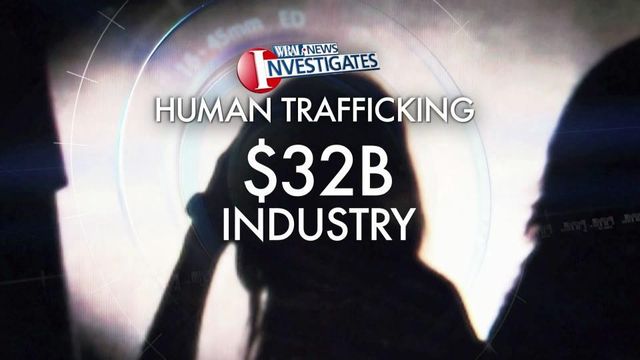Human trafficking 'is real, it's in North Carolina'
It's something seen in made-for-TV movies - women, often from other countries, forced into prostitution, tortured and held against their will in brothels. But it's not just a movie storyline - it's happening in North Carolina.
Posted — UpdatedHuman trafficking is one of the fastest growing criminal industries in the country, but the victims' stories are hard to tell. Many don’t want to come forward to authorities, or the media, for fear that they might be killed for telling what they know.
One woman, a 35-year-old mother of two little girls, agreed to tell her story to WRAL Investigates, as long as she was not identified. She says she was flown to the U.S. from Mexico after answering an ad online that promised a work VISA and an education scholarship, but that’s not what happened when she arrived in Georgia in 2005.
The woman says she was taken from the airport to a home, where she was held captive and forced to perform sex acts. She says other women and children, some of whom spoke languages she was not familiar with, were also held there.
“They raped us anytime they wanted to,” she said. “They began to beat us, and I received a lot of hits in my head. When I began to come to and realize what was happening, I didn’t have clothes and I was in chains.”
The woman says she remained a prisoner for three months.
“There was a lot of torture,” she said. “They fractured my arms. They burned me. They burned my legs.”
The woman was able to run away, but another woman fleeing with her was not able to escape.
“When we ran from the house, we were stabbed several times, and one of my friends was stabbed in the back and her lung, and she died,” the woman said.
After fleeing her captors, the woman was so severely injured, she was in the hospital for months, didn't speak for almost two years and was in a wheelchair for almost three years. Finally, she reached out for help. It's help that she hopes others will now get at places like the Salvation Army, thanks to an increasing amount of attention to this very serious problem.
Authorities found the child dead in a kudzu patch near the Lee-Harnett county line on Nov. 16, 2009. An autopsy determined that Shaniya died of asphyxiation and that her injuries were consistent with a sexual assault. Mario Andrette McNeill, 30, is charged with murder, kidnapping and rape in the case.
Authorities believe Antoinette Davis was complicit in her daughter's death. Arrest warrants stated that she "did knowingly provide Shaniya with the intent that she be held in sexual servitude" and "did permit an act of prostitution with Shaniya." A medical examiner noted in the autopsy that investigators believe the girl was used to pay off a drug debt.
“A lot of the traffickers are finding their way here to the United States. And when I say ‘a lot,’ I mean hundreds and hundreds and hundreds of cases are coming out every day,” said Paige Bagwell, director of operations and communications for the Salvation Army of Wake County.
After hearing more and more stories about human trafficking, The Salvation Army of Wake County hired two case managers to focus on identifying and providing services to victims.
“We started to see some of the stories that came through our doors and just knew that we needed to find our place in getting this eradicated,” Bagwell said.
Caitlin Ryland, an attorney with Legal Aid of North Carolina, says human trafficking does not always involve the sex trade. Some people are forced to perform other labor, such a farm work.
“Essentially, individuals are held somewhere against their will, and through force, fraud or coercion are forced to perform a commercial sex act or do labor,” Ryland said.
“Human trafficking is real, it’s here, it’s in North Carolina,” she added.
Douglas Coasey says he has worked on three farms in North Carolina and lived in labor camps where workers slept on the floor or in unsanitary beds with bed bugs. They also lived with leaky roofs and had rudimentary bathroom facilities and little access to food. The camps are often deep in the woods where workers are isolated and have no transportation to leave.
“They promise you these different things, but you don’t ever get it,” he said. “You end up sleeping on the floor. You end up taking a bath outside in the woods because of the crowdedness.”
Coasey says he finally left farm work last year and went into construction. He snuck away when his boss left the farm and was able to call a friend to help him escape from the camp.
“The only thing they know are dollar signs – how they make a dollar over you,” he said. “You make $5. They make $25.”
Local law enforcement agencies say they’re trying to get a handle on human trafficking cases. Often, many victims are afraid to come forward. That's why non-profits, like the Salvation Army, are trying to take the lead in helping people get away and transition into safe situations.
For the woman who escaped her captors and is now raising her two little girls, she says painting and playing the piano has helped her to heal.
“I’ve started to paint about a world that you can live (in) happily – very different from the world I was living in,” she said.
For others who are victims of human trafficking, the woman encourages them to “never lose your faith.”
“It was my faith in God and the Bible that helped me,” she said.
• Credits
Copyright 2024 by Capitol Broadcasting Company. All rights reserved. This material may not be published, broadcast, rewritten or redistributed.






